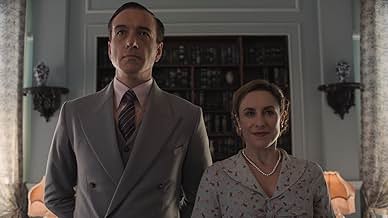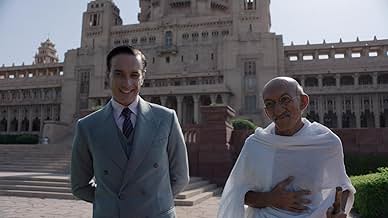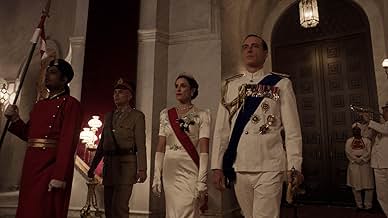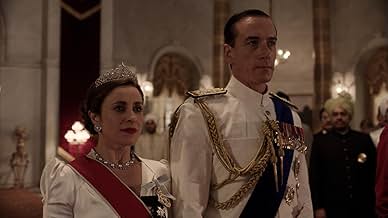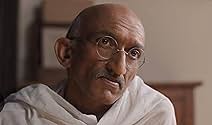Freedom at Midnight
- Serie de TV
- 2024–
CALIFICACIÓN DE IMDb
8.3/10
2.4 k
TU CALIFICACIÓN
La electrizante historia de la lucha de la India por la independencia. Basada en el bestseller del mismo nombre, narra la partición de India y Pakistán y la dinámica religiosa y sociopolític... Leer todoLa electrizante historia de la lucha de la India por la independencia. Basada en el bestseller del mismo nombre, narra la partición de India y Pakistán y la dinámica religiosa y sociopolítica de la época.La electrizante historia de la lucha de la India por la independencia. Basada en el bestseller del mismo nombre, narra la partición de India y Pakistán y la dinámica religiosa y sociopolítica de la época.
- Creación original
- Estrellas
- Premios
- 1 premio ganado y 18 nominaciones en total
Explorar episodios
- Creación original
- Todo el elenco y el equipo
- Producción, taquilla y más en IMDbPro
8.32.4K
1
2
3
4
5
6
7
8
9
10
Opiniones destacadas
Wonderful Series The History Of My INDIA
This Era Youth Needs to Understand the Real History and I will give freedom at midnight 10/10 as this is eye-opener for the youth. INDIA National Congress Have always thought of both Hindu Muslim in india
The kind of radical thinking going in country needed this eye-opener
The Bond of Jawahar Lal Nehru Andd Sadar Vallabh Bhai Patel Is So Beautiful Brotherly friend
The Way Sadar Vallabh Bhai Patel Respected Gandhi Ji
Jinnah's Thought and The Direct Action Day Plan the brutality happened in india and how Only congress party stood for them shows the unity thought of INDIAN NATION CONGRESS......
The Way Sadar Vallabh Bhai Patel Respected Gandhi Ji
Jinnah's Thought and The Direct Action Day Plan the brutality happened in india and how Only congress party stood for them shows the unity thought of INDIAN NATION CONGRESS......
10wtxsxvz
A powerful series based on a great book to viewed with no bias
I had read this book almost 45 years ago when I was in my twenties. So I was not sure whether the makers of the web series would be truthful to the book or would put their bias in. I was delighted to see that they were truthful to the book. For those who criticize the decisions made in 1946-1947, should realize that their arguments are based on the luxury of their knowledge of what happened between 1946 and 2024. The series shows the struggles all the leaders were having in deciding about partition. Everyone should watch this series with an open mind. Even Jinnah saw an opportunity to be the leader of a brand new country and took it. After all, he was a politician. Great series, production design, background score.
"Freedom at Midnight: A Brilliantly Acted Masterpiece That Brings History to Life"
The Freedom at Midnight series on SonyLIV is one of the best historical dramas I've watched to date. Its gripping portrayal of India's independence and the Partition is both emotionally resonant and historically rich. Directed by Nikkhil Advani, the series features brilliant performances by the cast, who breathe life into iconic figures like Gandhi, Nehru, Jinnah, and Mountbatten.
The storytelling is immersive, enhanced by authentic set designs and a hauntingly powerful soundtrack. While the pace is slow in the initial episodes, it builds up to an emotionally charged climax. The depiction of communal tensions and political negotiations is both vivid and thought-provoking.
The actors' nuanced portrayals and the show's attention to detail make it a standout. It's a deeply impactful series that leaves a lasting impression. A must-watch for history enthusiasts!
The storytelling is immersive, enhanced by authentic set designs and a hauntingly powerful soundtrack. While the pace is slow in the initial episodes, it builds up to an emotionally charged climax. The depiction of communal tensions and political negotiations is both vivid and thought-provoking.
The actors' nuanced portrayals and the show's attention to detail make it a standout. It's a deeply impactful series that leaves a lasting impression. A must-watch for history enthusiasts!
A Solid Portrayal of Ind-Pak Partition Politics With Stellar Acting !!!
At the stroke of midnight on August 14, 1947, India gained freedom from over 200 years of British colonial rule. While the birth of a free India should have been a moment of celebration, it was overshadowed by the darkness of Partition. Nikkhil Advani's Freedom At Midnight, a latest web series on SonyLIV, which takes its title and story from Larry Collins and Dominique Lapierre's seminal book, offers a powerful glimpse into the trials, tragedies, and turmoil of that fateful period.
The series begins in 1946 with a persistent Mahatma Gandhi declaring, "Hindustan ka batwara hone se pehle, mere shareer ka batwara hoga (Before the Partition of India, my body will be divided)." It soon moves over to offer a painful account of India's Partition and the violent birth of Independent India. Religious conflicts, border wars, and political sacrifices unfold with each episode, like dramatic scenes in a grand pageant.
The dialogues and performances strike emotional chords quite effectively. Take, for example, lines like "Aam aadmi vo badlaav laa sakta hai jo sarkaar saalon mein nahi laa sakti" (The common man can bring about change that the government couldn't in years) or "Ye log Hindu hone se pehle bhi Punjabi ya Bengali hain" (These people are Punjabi or Bengali before they are Hindu).
The central characters in the show include Lord Mountbatten, the great-grandson of Queen Victoria, who constantly haggles with Jawaharlal Nehru, the leader of the Congress party, torn between his principles and his party's ideals; Mohammed Ali Jinnah, the fanatical leader of the Muslim League, who sees only two options: "Ya toh Hindustan batega ya barbaad hoga" (Either Hindustan will be divided, or it will be destroyed); and MK Gandhi, who ultimately gives up his dream of a united India, over the terms of how an independent India will move forward.
Siddhant Gupta, who was well admired in Prime Video's Jubilee, once again proves his acting prowess as he steps into the role of India's first Prime Minister, Jawaharlal Nehru. But the standout performance comes from Arif Zakaria as Mohammed Ali Jinnah. He is utterly convincing as the resolute leader of the Muslim League, whose singular vision was the creation of Pakistan. Chirag Vohra as Gandhi and Rajendra Chawla as Sardar Vallabhbhai Patel also deliver strong performances. The supporting cast further elevates the series, adding an extra layer of depth to the story.
Nikkhil Advani closes the show just before the horrors of the Partition unfold on India's land, accompanied by the song "Vaishnav jan to tene kahiye je, peer paraayi jaani re" (A good human being is the one who knows the pain of others). It's a haunting note that leaves you wishing political leaders, from any period - past or present - could truly feel the pain of the people they serve.
Not only is it competently crafted and acted, it also tells a story replete with known and unknown nuggets of information that are processed with skill and sensitivity. It has no grandstanding, and no hectoring and hollering of the sort that mainstream Bollywood is prone to.
The show gives history its due, meticulously piecing together the fragments that went into the making of an essential and wondrous, if inevitably imperfect, whole.
The series begins in 1946 with a persistent Mahatma Gandhi declaring, "Hindustan ka batwara hone se pehle, mere shareer ka batwara hoga (Before the Partition of India, my body will be divided)." It soon moves over to offer a painful account of India's Partition and the violent birth of Independent India. Religious conflicts, border wars, and political sacrifices unfold with each episode, like dramatic scenes in a grand pageant.
The dialogues and performances strike emotional chords quite effectively. Take, for example, lines like "Aam aadmi vo badlaav laa sakta hai jo sarkaar saalon mein nahi laa sakti" (The common man can bring about change that the government couldn't in years) or "Ye log Hindu hone se pehle bhi Punjabi ya Bengali hain" (These people are Punjabi or Bengali before they are Hindu).
The central characters in the show include Lord Mountbatten, the great-grandson of Queen Victoria, who constantly haggles with Jawaharlal Nehru, the leader of the Congress party, torn between his principles and his party's ideals; Mohammed Ali Jinnah, the fanatical leader of the Muslim League, who sees only two options: "Ya toh Hindustan batega ya barbaad hoga" (Either Hindustan will be divided, or it will be destroyed); and MK Gandhi, who ultimately gives up his dream of a united India, over the terms of how an independent India will move forward.
Siddhant Gupta, who was well admired in Prime Video's Jubilee, once again proves his acting prowess as he steps into the role of India's first Prime Minister, Jawaharlal Nehru. But the standout performance comes from Arif Zakaria as Mohammed Ali Jinnah. He is utterly convincing as the resolute leader of the Muslim League, whose singular vision was the creation of Pakistan. Chirag Vohra as Gandhi and Rajendra Chawla as Sardar Vallabhbhai Patel also deliver strong performances. The supporting cast further elevates the series, adding an extra layer of depth to the story.
Nikkhil Advani closes the show just before the horrors of the Partition unfold on India's land, accompanied by the song "Vaishnav jan to tene kahiye je, peer paraayi jaani re" (A good human being is the one who knows the pain of others). It's a haunting note that leaves you wishing political leaders, from any period - past or present - could truly feel the pain of the people they serve.
Not only is it competently crafted and acted, it also tells a story replete with known and unknown nuggets of information that are processed with skill and sensitivity. It has no grandstanding, and no hectoring and hollering of the sort that mainstream Bollywood is prone to.
The show gives history its due, meticulously piecing together the fragments that went into the making of an essential and wondrous, if inevitably imperfect, whole.
What if Jinha's health condition was known to all???? Nice adaption of a great book by my fav authors duo...
"Heat not a furnace for your foe so hot that it do singe yourself."
Freedom at Midnight is a series based on Larry Collins and Dominique Lapierre's gigantic bestseller of the same name. Given the piercingly researched, strikingly visual source-material, it was always meant to be. Collins and Lapierre finished the book in 1975, just 25 years after India gained independence.
Starting in the early 1970s, the authors had unprecedented personal access to Lord Mountbatten, who was a fan of their book "Is Paris Burning?". They also accessed Jinnah's X-ray, which proved that so-called Quaid-e-Azam knew he suffered from advanced stage tuberculosis and that he wouldn't survive long - maximum a year or so!! Mountbatten told Lapierre-Collins that if he knew this, he would have delayed the decision on partition, which would have then changed the course of sub-continent's history.
Nikhil Advani, the creator of the series, says he chose to focus on events leading up to India's independence. However, Freedom at Midnight is a difficult show to make, as it is about history and politics and relies heavily on verbose conversations, meetings, debates, speeches, decisions, exposition, heavy dialogues and individual's perception.
The series features impressive performances, particularly from Chirag Vohra as Gandhi and Rajendra Chawla as Sardar Vallabhbhai Patel. Vohra delivers a physically canny rendition of Gandhi, while Chawla nails the Gujarati twang and injects Patel's shrewdness with pangs of paternal sincerity.
It's worth noting that the book "Freedom at Midnight" has been adapted into various forms, including a TV series in 1988 and a movie Gandhi with Ben Kingsley directed by Richard Attenborough. While the movie focuses primarily on Gandhi's life and role in India's struggle for independence, this TV series takes a broader approach, covering the final years of British rule in India and the events leading up to independence. This series is more of a historic epic with more emphasis on political and social upheavals of the time. It manages to capture the essence of the time period.
I have a personal connection with this book having read it during my college days. It was one of the first books (first book being The Good Earth) in English literature that I read and it left an everlasting impression on me. Even today, it gives me goosebumps to think about the horrifying incidents written by the authors, particularly the riots that started in Punjab.
After reading "Freedom at Midnight", I became a huge fan of the author duo and went on to read their other books in a marathon session. I devoured "Is Paris Burning?", "O Jerusalem", "City of Joy" and "Fall from Grace", among others. I owe a debt of gratitude to my dear friend Chetan Desai who introduced me not only to Collins and Lapierre but also to other renowned authors like Leon Uris, Somerset Maugham, Ayn Rand, Hermann Hesse and more. He also sparked my interest in English literature that has been a lifelong passion since then.
While the series may be challenging to follow at times due to its focus on politics and history, it is undoubtedly a must-watch for anyone interested in last days of British Raj and dawn of India's freedom. The ability of this series to balance individual perspectives with historical events makes it a unique and engaging viewing experience.
Overall, Freedom at Midnight is a gripping and informative series that sheds light on a pivotal moment in Indian history. I do however recommend reading the book.
Freedom at Midnight is a series based on Larry Collins and Dominique Lapierre's gigantic bestseller of the same name. Given the piercingly researched, strikingly visual source-material, it was always meant to be. Collins and Lapierre finished the book in 1975, just 25 years after India gained independence.
Starting in the early 1970s, the authors had unprecedented personal access to Lord Mountbatten, who was a fan of their book "Is Paris Burning?". They also accessed Jinnah's X-ray, which proved that so-called Quaid-e-Azam knew he suffered from advanced stage tuberculosis and that he wouldn't survive long - maximum a year or so!! Mountbatten told Lapierre-Collins that if he knew this, he would have delayed the decision on partition, which would have then changed the course of sub-continent's history.
Nikhil Advani, the creator of the series, says he chose to focus on events leading up to India's independence. However, Freedom at Midnight is a difficult show to make, as it is about history and politics and relies heavily on verbose conversations, meetings, debates, speeches, decisions, exposition, heavy dialogues and individual's perception.
The series features impressive performances, particularly from Chirag Vohra as Gandhi and Rajendra Chawla as Sardar Vallabhbhai Patel. Vohra delivers a physically canny rendition of Gandhi, while Chawla nails the Gujarati twang and injects Patel's shrewdness with pangs of paternal sincerity.
It's worth noting that the book "Freedom at Midnight" has been adapted into various forms, including a TV series in 1988 and a movie Gandhi with Ben Kingsley directed by Richard Attenborough. While the movie focuses primarily on Gandhi's life and role in India's struggle for independence, this TV series takes a broader approach, covering the final years of British rule in India and the events leading up to independence. This series is more of a historic epic with more emphasis on political and social upheavals of the time. It manages to capture the essence of the time period.
I have a personal connection with this book having read it during my college days. It was one of the first books (first book being The Good Earth) in English literature that I read and it left an everlasting impression on me. Even today, it gives me goosebumps to think about the horrifying incidents written by the authors, particularly the riots that started in Punjab.
After reading "Freedom at Midnight", I became a huge fan of the author duo and went on to read their other books in a marathon session. I devoured "Is Paris Burning?", "O Jerusalem", "City of Joy" and "Fall from Grace", among others. I owe a debt of gratitude to my dear friend Chetan Desai who introduced me not only to Collins and Lapierre but also to other renowned authors like Leon Uris, Somerset Maugham, Ayn Rand, Hermann Hesse and more. He also sparked my interest in English literature that has been a lifelong passion since then.
While the series may be challenging to follow at times due to its focus on politics and history, it is undoubtedly a must-watch for anyone interested in last days of British Raj and dawn of India's freedom. The ability of this series to balance individual perspectives with historical events makes it a unique and engaging viewing experience.
Overall, Freedom at Midnight is a gripping and informative series that sheds light on a pivotal moment in Indian history. I do however recommend reading the book.
¿Sabías que…?
- TriviaAdapted from the book of the same name, authored by Dominique Lapierre and Larry Collins.
Selecciones populares
Inicia sesión para calificar y agrega a la lista de videos para obtener recomendaciones personalizadas
Detalles
- Color
Contribuir a esta página
Sugiere una edición o agrega el contenido que falta


![Trailer [OV]](https://m.media-amazon.com/images/M/MV5BOWRlODBkMWItNzdlMC00MDhjLThmNjAtNGYyMzg0NDNlZmI3XkEyXkFqcGdeQXRyYW5zY29kZS13b3JrZmxvdw@@._V1_QL75_UX500_CR0)
